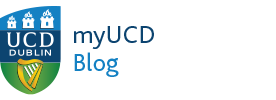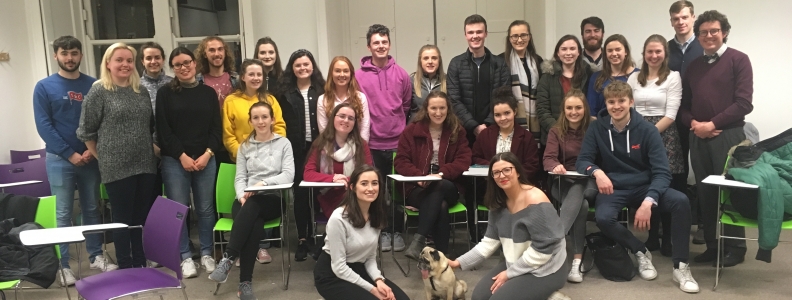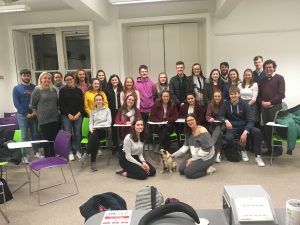Have you ever thought about being a science and maths teacher? Aisling explains why she decided to pursue the Science Education Pathway in UCD to reach her goal of being a secondary school science teacher.
“Teaching is the greatest act of optimism.”
– Colleen Wilcox
“What stream are you in?”
“Chemistry.”
“Oh, grand.”
“Well, I’m actually doing the education pathway – Chemistry and Maths Education.”
“What? Really? Interesting choice. Why?”
“Em, because I want to teach science and maths.”
“Wow, you’re doing a lot of work in this course then just to be a teacher.”
Sigh. I have had that conversation, and many variations of that conversation, with a lot of people. Whether it be peers in Science, relatives, friends from home. They don’t mean any harm of course, but that “just a teacher” comment is one I have heard many times. I want to teach. And I want to be a good teacher. I could have gone anywhere to do teacher training, but I wanted to do it through the DN200 Science course here in UCD because I knew it would give me the best training and opportunities.
UCD Science offers Chemistry & Mathematics, Biology & Mathematics, Physics & Mathematics, Applied Mathematics & Mathematics Education to its students as degree options. These degrees involve a four-year undergraduate programme in which students take integrated education modules in first and second year. They still learn much of the same content as their cohorts in the other science programmes. Why? Well, shouldn’t someone teaching a class of teenagers have as much background knowledge in their subject as possible?
You start with one education module in first year – Mathematics & Science Education & Communication, taught by Dr. Aoibhinn Ní Shúilleabháín. Basically, this module is examining how we learn maths. It introduces any student even slightly considering pursuing teaching to the theory and research in maths education in Ireland and abroad. Students can have a taste of teaching without having to commit to anything, which is what appealed to me so much about the programme. Committing to something like teaching immediately when you are as unsure as an 18-year old would be about their future is certainly scary!
You have not one, but two years to decide if this is what you want to pursue. In second year, most of your modules are still with all the others in science, with two education modules – one per trimester. I am currently in the thick of Science and Maths Pedagogy taught by Dr. Shane Bergin, who takes you away from the daily grind of studying into a relaxed environment of open discussion and collaboration in his classes. This module involves education students helping local primary school students to design and carry out their own science experiments. Again, this allows the prospective student teachers to think even more about whether they want to stick with this programme or not.
Committing to the programme happens in third year, when everyone in Science must choose one of 30 degrees. That is when more hands-on secondary teaching placement comes into force. You still have regular science modules (I’ll still be working away in the lab next year!), but much more emphasis is placed on education practice and methodology. Fourth year is even more intense, where even more placement is carried out. A huge advantage of the programme is the fifth year – the Master in Education year. While PMEs (Professional Masters of Education) in any other situation are two years long, The MSc Mathematics and Science Education offered through this programme is one year only, and after your fifth year is complete, you are fully qualified and accredited to the Teaching Council of Ireland.
Admittedly, I knew that I wanted to pursue the education pathway before I started in UCD. I could not see myself doing anything other than teaching. At the same time, it was always comforting to have the freedom associated with the programme in that I could opt out if I had a change of heart. I couldn’t recommend it more to any prospective UCD Science students who have teaching in the back of their minds. The class groups are small and the lecturers really look out for you and strive to make things easier for you whenever you experience difficulty. Moreover, UCD provides many resources that are majorly helpful for education students like the Maths Support Centre and the Writing Support Centre. This way you have extra help to tackle those tricky maths problems and bewildering essay titles.
Personally, I think that teaching is an overlooked and under-appreciated profession. Good teachers can inspire those to pursue their subjects and go on to become doctors, engineers, politicians and a myriad of other important roles in society. UCD is a fantastic place to learn how to be the best teacher you can be.
To find our more about the Science Education Pathway in UCD visit the MyUCD website here.








